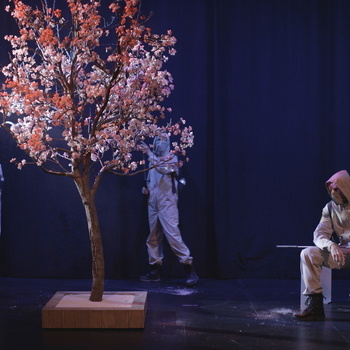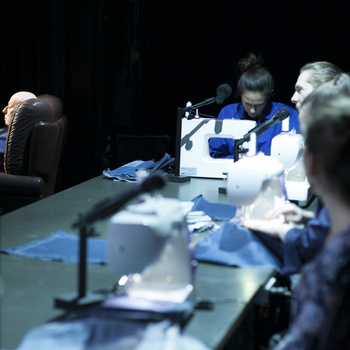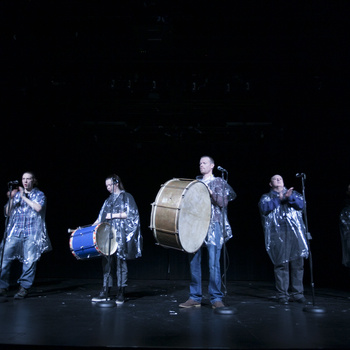Text written by the artistic ensemble of the production
The Man Who Watched the World
Mladinsko Theatre
Schedule
Première 22 January 2017, Upper Hall of the Mladinsko Theatre
Running time approximately 2 hours and 5 minutes. No interval.
Director Žiga Divjak
Dramaturg Katarina Morano
Set designer Tina Mohorović
Costume designer Tina Pavlović
Composer Beno Gec
Language consultant Mateja Dermelj
Lighting designer David Orešič
Sound designer Beno Gec, Marijan Sajovic
Video and slide projection designer Domen Martinčič
Stage manager Janez Pavlovčič
Cast
Sara Dirnbek as guest • Ivan Godnič • Anja Novak • Gregor Prah as guest • Katarina Stegnar • Matija Vastl
"While one is slowly dying from a long illness, the most terrifying thing is that the deterioration happens on a daily basis but on such a tiny scale that it is practically unnoticeable. You might even think that the dying is actually improving. But then you recall: a week ago he was able to get up by himself and now he can only turn around. Then you forget about it and in a while you notice with dread and surprise that he cannot even turn around and that he is raising his head with difficulty. This is the first time that you overlook the inevitable. The same thing happens with the end of the world." Jakov Druskin
Created by the artistic team, The Man Who Watched the World stems out of a feeling that the end of the world is not merely the apocalypse awaiting somewhere over there to unfold, but it is rather omni-present in the microcosms of the people, families, individuals deprived of their voices and position in the world; an apocalypse that moves so fast that it is already at rest. It stems out of a feeling that you are riding on a long long road in a car that is running out of gas; that the car is riding, the gas is gone, the goal is gone, there are no rescue stations. The car goes on and on. We just have to be a little more patient and it will get better. A bit more, a bit more, and it will get better. Is the apocalypse really a matter of the future?
The production on the state of affairs in the world communicates both through a well-calculated intimacy and a candid naïvety. Rather than being a spectacle, it is focused on confession, although it manages to bring about quite a few visually effective scenes, like the one with a tree being sprayed by people in protective suits […]. The production manages to fuse the documentary and the low-key dramatic, thus producing an air of epic with oblique engagement. It is hidden in the selection of images and frail scenes that make the entirety of what one should see and, through the production, perhaps even what one might perceive in terms of one’s place and task in this world.
Matej Bogataj, Sodobnost, April 2017




